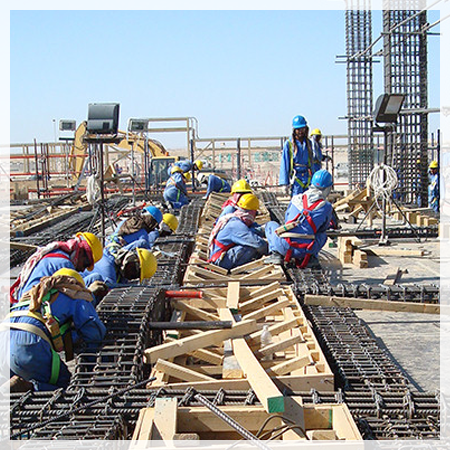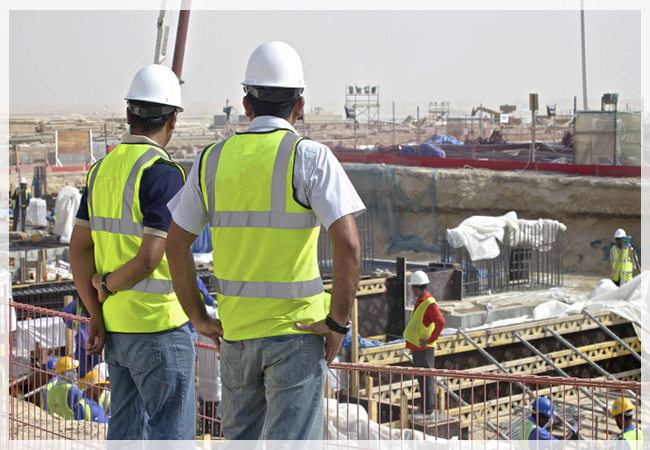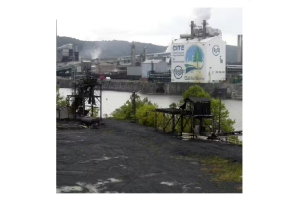Currency
August 27, 2017

It is undeniable that the dynamics of delivering a construction project in the Gulf are rapidly changing. As regional leaders contend with the impact of reduced petrodollars, a new economy is emerging within the GCC’s building market. Developers, now faced with limited budgets, are demanding more environment-friendly projects, at lower costs, and within shorter timelines.
Now more than ever, a project manager holds the key to rationalising the oft-challenging demands of construction teams in the GCC. As William Haddad, chairman and founder of MACE Contractors, explains, shifting economic trends have reiterated the need for agility in project management teams.

“In these tight times, where every dirham counts and is counted, our focus has shifted to value-creation and value engineering,” Haddad tells Construction Week.
“Therefore, project managers have to become more strategic thinkers. It is important to understand that every project is embedded in a strategy. This means that if we don’t understand a company’s strategy, then we cannot decide which projects should be executed and which shouldn’t.
“Therefore, strategy needs to be clear at all parts of the organisation to make decisions that are aligned and speak the same language. “[The] big challenge that companies are facing today is the ability to translate strategy into well-defined actions, such as projects and programmes that need to be implemented. Achieving this requires competent people, and the application of the right processes and tools,” Haddad says. Amid contemporary market conditions, construction finance has become a notable determinant of project management delivery programmes.
However, as Brian Fisher, head of project management at Faithful+Gould Middle East, points out, the significance of competent change management in mitigating construction risk cannot be understated, regardless of market finance patterns. Fisher has supported – and is continuing to support – the delivery of some of the Middle East’s most ambitious projects, including Dubai’s Royal Atlantis Resort and Residences.
“The ability of a competent project manager to manage risk and change, and ensure that the client is communicated to as soon as issues [may] arise, is paramount to any project’s success,” he tells Construction Week.“During periods of low or tight liquidity, budgets are understandably monitored and managed in even more detail. In these [situations], clients place incredible emphasis on change and risk management, as capital is constrained. This doesn’t detract from the core competencies of project management – it just places a particular area in the spotlight.”
The spotlight might just benefit – in more ways than one – regional project managers, who have historically had to contend with lack of awareness about the value they can add as part of a project team. Fortunately, as Fisher points out, this perception is changing. “There is still a mixed view of project managers across the GCC,” he says.
“In more mature countries and clients, an understanding of the [project manager’s] value has evolved over the years, and the [...] role has evolved, from being a post-box or policeman, into a person or a team that develops a strategic value chain for the client and brings specific specialisms to different project types.”
The client-centric approach Haddad previously outlined is also finding its way into the Gulf’s construction sector, thanks to clients that want “project managers to be truly embedded within their team”, Fisher says. “There are still some entities that prefer to not utilise project managers, although the percentage [of such firms] has been dropping. In times of tight finances, it can be easy to look to cut this [expense] from the development budgets, but this rarely aids the turn-out costs, as the outlay is a relatively minimal percentage of the overall budget, and a competent project manager can either save or prevent expenditure many times the consultancy cost,” Fisher adds.
Clients reluctant to employ project management teams may find themselves left behind in a market that is quickly adopting new models to fund its products. As Ashraf Al-Garf, chief executive officer at Projacs International, explains, public-private partnerships (PPPs) – a fundraising model that is gaining immense popularity in the GCC – reiterates the important role of project managers in construction teams: “Most owners, whether public or private clients, are implementing PPP schemes, where project managers [are necessary].
“However, the approach of having this scope mandated by the owners has changed. Project management firms have to be part of a big consortium, mainly led by the general contractor or the financial body, [who] should be flexible enough to adopt our work models to cope with [PPP needs].” While hurdles related to perception and cost-benefit remain unchanged, today’s typical project management team, led by risk-averse construction clients, is evolving into a more flexible entity than ever before.
“Due to current economical limitations, project management firms have to adapt themselves and offer [independent] services,” Al-Garf tells Construction Week. “It is not necessary [for the client demand] for the full project or cost management scope, so we should be flexible and ready to offer [individual] services, such as design reviews, value engineering, costing, planning, and so on. “However, the one-stop shop approach should also be considered. Project management firms should be ready to include construction supervision or management [specialists to their] site teams.
“Although this may [seem to be a] conflict of interest, many private clients believe that this is better for them, and project management firms should be fully equipped to include this scope to their teams,” Al-Garf adds. Faithful+Gould’s Fisher, and MACE’s Haddad, say they believe that integrated project management is the next step for the industry in the GCC – a move that will be supported by the uptake of technology in the region’s construction sector.
“The introduction of IT-based project management tools has helped contractors reduce complexities in the construction of large projects by automating the monitoring and supervision of processes,” Haddad says.“It enables contactors to raise work completion requests during the finishing stage and allows project engineers to verify and approve, allowing daily monitoring of site work based on real-time data and decreasing work slippages. Technology has made each entity more liable for its actions, with a clear central database point of reference.”
Meanwhile, Fisher expounds the benefits of technology for project management firms, as well as the work they produce: “As integrated project and programme managers, we have seen changes in the discipline through two sets of eyes – how we manage our services internally, and how we manage the delivery of projects for clients.
“We have seen the implementation of technology gaining momentum over the past few years, especially since clients are looking for project managers with innovative ideas to better deliver services. Clients [are starting to] appreciate the benefits they stand to gain directly from the implementation of such technologies. Traditional project managers were [operating] by applying project experience to data gathered during the preceding reporting period.
“Most of their time was spent on collecting, screening, and presenting the data, leaving limited time to add value through diagnostics and analyses,” Fisher continues. “[Now], the expectations for business reporting are gigabytes away from these traditional reporting features. Workflows and business processes enable automated collection of data at a granular level, guaranteeing quality and correctness of data.”
Fisher is hopeful about a more tech-savvy future for project managers: “Like every other disruption to business, digital disruption is here to stay with very exciting possibilities.”
Now more than ever, a project manager holds the key to rationalising the oft-challenging demands of construction teams in the GCC. As William Haddad, chairman and founder of MACE Contractors, explains, shifting economic trends have reiterated the need for agility in project management teams.

“In these tight times, where every dirham counts and is counted, our focus has shifted to value-creation and value engineering,” Haddad tells Construction Week.
“Therefore, project managers have to become more strategic thinkers. It is important to understand that every project is embedded in a strategy. This means that if we don’t understand a company’s strategy, then we cannot decide which projects should be executed and which shouldn’t.
“Therefore, strategy needs to be clear at all parts of the organisation to make decisions that are aligned and speak the same language. “[The] big challenge that companies are facing today is the ability to translate strategy into well-defined actions, such as projects and programmes that need to be implemented. Achieving this requires competent people, and the application of the right processes and tools,” Haddad says. Amid contemporary market conditions, construction finance has become a notable determinant of project management delivery programmes.
However, as Brian Fisher, head of project management at Faithful+Gould Middle East, points out, the significance of competent change management in mitigating construction risk cannot be understated, regardless of market finance patterns. Fisher has supported – and is continuing to support – the delivery of some of the Middle East’s most ambitious projects, including Dubai’s Royal Atlantis Resort and Residences.
“The ability of a competent project manager to manage risk and change, and ensure that the client is communicated to as soon as issues [may] arise, is paramount to any project’s success,” he tells Construction Week.“During periods of low or tight liquidity, budgets are understandably monitored and managed in even more detail. In these [situations], clients place incredible emphasis on change and risk management, as capital is constrained. This doesn’t detract from the core competencies of project management – it just places a particular area in the spotlight.”
The spotlight might just benefit – in more ways than one – regional project managers, who have historically had to contend with lack of awareness about the value they can add as part of a project team. Fortunately, as Fisher points out, this perception is changing. “There is still a mixed view of project managers across the GCC,” he says.
“In more mature countries and clients, an understanding of the [project manager’s] value has evolved over the years, and the [...] role has evolved, from being a post-box or policeman, into a person or a team that develops a strategic value chain for the client and brings specific specialisms to different project types.”
The client-centric approach Haddad previously outlined is also finding its way into the Gulf’s construction sector, thanks to clients that want “project managers to be truly embedded within their team”, Fisher says. “There are still some entities that prefer to not utilise project managers, although the percentage [of such firms] has been dropping. In times of tight finances, it can be easy to look to cut this [expense] from the development budgets, but this rarely aids the turn-out costs, as the outlay is a relatively minimal percentage of the overall budget, and a competent project manager can either save or prevent expenditure many times the consultancy cost,” Fisher adds.
Clients reluctant to employ project management teams may find themselves left behind in a market that is quickly adopting new models to fund its products. As Ashraf Al-Garf, chief executive officer at Projacs International, explains, public-private partnerships (PPPs) – a fundraising model that is gaining immense popularity in the GCC – reiterates the important role of project managers in construction teams: “Most owners, whether public or private clients, are implementing PPP schemes, where project managers [are necessary].
“However, the approach of having this scope mandated by the owners has changed. Project management firms have to be part of a big consortium, mainly led by the general contractor or the financial body, [who] should be flexible enough to adopt our work models to cope with [PPP needs].” While hurdles related to perception and cost-benefit remain unchanged, today’s typical project management team, led by risk-averse construction clients, is evolving into a more flexible entity than ever before.
“Due to current economical limitations, project management firms have to adapt themselves and offer [independent] services,” Al-Garf tells Construction Week. “It is not necessary [for the client demand] for the full project or cost management scope, so we should be flexible and ready to offer [individual] services, such as design reviews, value engineering, costing, planning, and so on. “However, the one-stop shop approach should also be considered. Project management firms should be ready to include construction supervision or management [specialists to their] site teams.
“Although this may [seem to be a] conflict of interest, many private clients believe that this is better for them, and project management firms should be fully equipped to include this scope to their teams,” Al-Garf adds. Faithful+Gould’s Fisher, and MACE’s Haddad, say they believe that integrated project management is the next step for the industry in the GCC – a move that will be supported by the uptake of technology in the region’s construction sector.
“The introduction of IT-based project management tools has helped contractors reduce complexities in the construction of large projects by automating the monitoring and supervision of processes,” Haddad says.“It enables contactors to raise work completion requests during the finishing stage and allows project engineers to verify and approve, allowing daily monitoring of site work based on real-time data and decreasing work slippages. Technology has made each entity more liable for its actions, with a clear central database point of reference.”
Meanwhile, Fisher expounds the benefits of technology for project management firms, as well as the work they produce: “As integrated project and programme managers, we have seen changes in the discipline through two sets of eyes – how we manage our services internally, and how we manage the delivery of projects for clients.
“We have seen the implementation of technology gaining momentum over the past few years, especially since clients are looking for project managers with innovative ideas to better deliver services. Clients [are starting to] appreciate the benefits they stand to gain directly from the implementation of such technologies. Traditional project managers were [operating] by applying project experience to data gathered during the preceding reporting period.
“Most of their time was spent on collecting, screening, and presenting the data, leaving limited time to add value through diagnostics and analyses,” Fisher continues. “[Now], the expectations for business reporting are gigabytes away from these traditional reporting features. Workflows and business processes enable automated collection of data at a granular level, guaranteeing quality and correctness of data.”
Fisher is hopeful about a more tech-savvy future for project managers: “Like every other disruption to business, digital disruption is here to stay with very exciting possibilities.”









